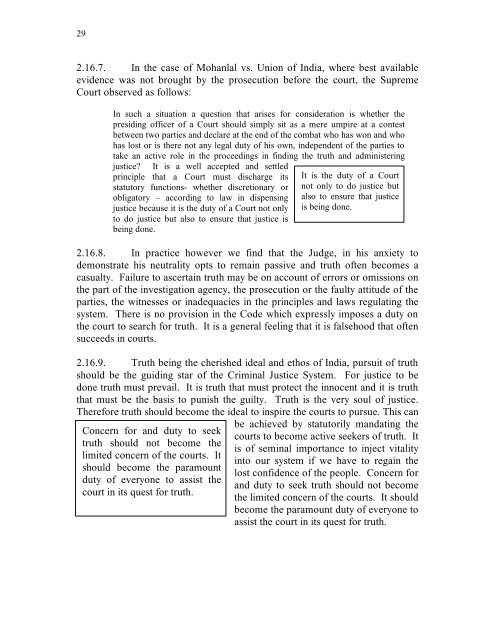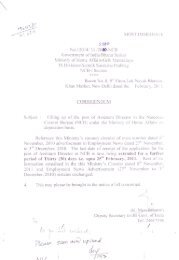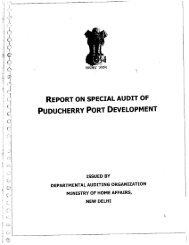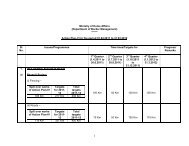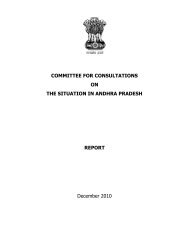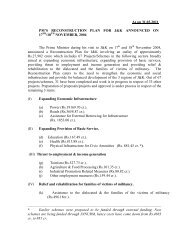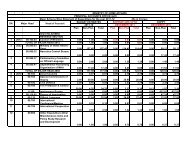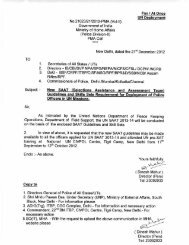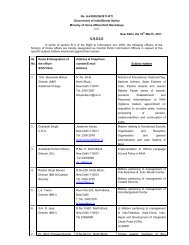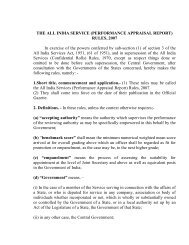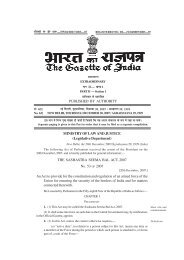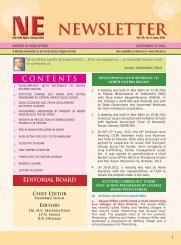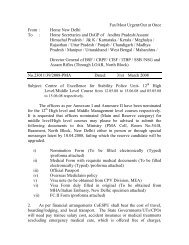Dr. Justice V.S. Malimath Report First pages - Ministry of Home Affairs
Dr. Justice V.S. Malimath Report First pages - Ministry of Home Affairs
Dr. Justice V.S. Malimath Report First pages - Ministry of Home Affairs
You also want an ePaper? Increase the reach of your titles
YUMPU automatically turns print PDFs into web optimized ePapers that Google loves.
29<br />
2.16.7. In the case <strong>of</strong> Mohanlal vs. Union <strong>of</strong> India, where best available<br />
evidence was not brought by the prosecution before the court, the Supreme<br />
Court observed as follows:<br />
In such a situation a question that arises for consideration is whether the<br />
presiding <strong>of</strong>ficer <strong>of</strong> a Court should simply sit as a mere umpire at a contest<br />
between two parties and declare at the end <strong>of</strong> the combat who has won and who<br />
has lost or is there not any legal duty <strong>of</strong> his own, independent <strong>of</strong> the parties to<br />
take an active role in the proceedings in finding the truth and administering<br />
justice? It is a well accepted and settled<br />
principle that a Court must discharge its<br />
statutory functions- whether discretionary or<br />
obligatory – according to law in dispensing<br />
justice because it is the duty <strong>of</strong> a Court not only<br />
to do justice but also to ensure that justice is<br />
being done.<br />
2.16.8. In practice however we find that the Judge, in his anxiety to<br />
demonstrate his neutrality opts to remain passive and truth <strong>of</strong>ten becomes a<br />
casualty. Failure to ascertain truth may be on account <strong>of</strong> errors or omissions on<br />
the part <strong>of</strong> the investigation agency, the prosecution or the faulty attitude <strong>of</strong> the<br />
parties, the witnesses or inadequacies in the principles and laws regulating the<br />
system. There is no provision in the Code which expressly imposes a duty on<br />
the court to search for truth. It is a general feeling that it is falsehood that <strong>of</strong>ten<br />
succeeds in courts.<br />
2.16.9. Truth being the cherished ideal and ethos <strong>of</strong> India, pursuit <strong>of</strong> truth<br />
should be the guiding star <strong>of</strong> the Criminal <strong>Justice</strong> System. For justice to be<br />
done truth must prevail. It is truth that must protect the innocent and it is truth<br />
that must be the basis to punish the guilty. Truth is the very soul <strong>of</strong> justice.<br />
Therefore truth should become the ideal to inspire the courts to pursue. This can<br />
Concern for and duty to seek<br />
truth should not become the<br />
limited concern <strong>of</strong> the courts. It<br />
should become the paramount<br />
duty <strong>of</strong> everyone to assist the<br />
court in its quest for truth.<br />
It is the duty <strong>of</strong> a Court<br />
not only to do justice but<br />
also to ensure that justice<br />
is being done.<br />
be achieved by statutorily mandating the<br />
courts to become active seekers <strong>of</strong> truth. It<br />
is <strong>of</strong> seminal importance to inject vitality<br />
into our system if we have to regain the<br />
lost confidence <strong>of</strong> the people. Concern for<br />
and duty to seek truth should not become<br />
the limited concern <strong>of</strong> the courts. It should<br />
become the paramount duty <strong>of</strong> everyone to<br />
assist the court in its quest for truth.


